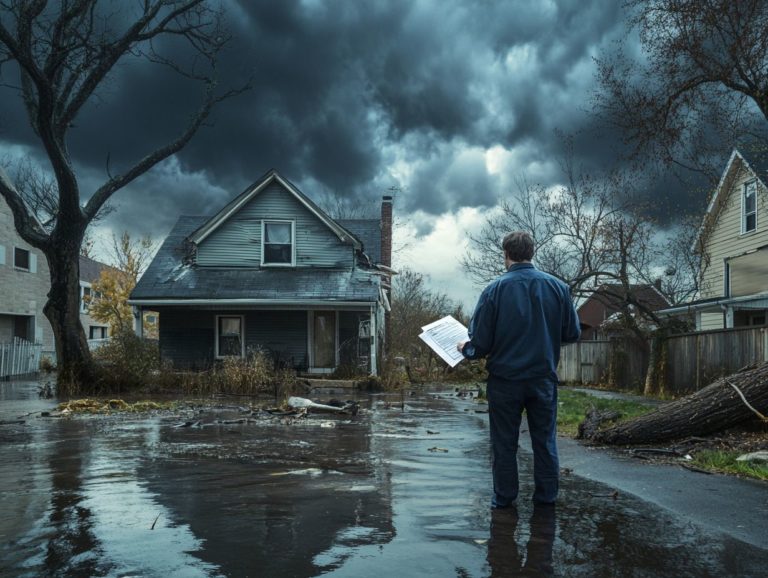The Role of Home Insurance in Renting
Understanding home insurance can transform your experience as a renter. It offers essential protection against unforeseen events. Many tenants mistakenly believe that their landlord’s insurance covers personal belongings or liability, but this assumption is inaccurate.
This article explores home insurance, highlighting its importance for renters and the various types of coverage available. It examines factors that affect insurance rates, provides tips for selecting the right policy, and dispels common myths to ensure you’re fully informed and ready to make savvy decisions.
Contents
Key Takeaways:
- Home insurance is vital for renters, protecting personal property and providing liability coverage.
- It covers additional living expenses if unexpected events occur.
- The cost of renters insurance depends on factors like location, property type, credit score, and claims history.
- Evaluating coverage needs and comparing quotes from different providers helps find the best fit for your budget.

Understanding Home Insurance for Renters
Home insurance for renters is essential in today’s rental market. It encompasses various policies tailored to unique insurance needs, providing financial protection for both tenants and landlords. Understanding the role of home insurance in mortgages is also crucial for comprehensive coverage.
Renters insurance typically covers personal belongings, while homeowners insurance protects the structure itself. Landlord insurance focuses on rental properties and potential loss of rental income.
As short-term rentals like Airbnb and Vrbo gain popularity, familiarize yourself with different insurance options, including endorsements (additions to your policy) and riders (extra coverage), to meet your specific needs and mitigate risks effectively.
What is Home Insurance?
Home insurance includes policies providing financial protection for homeowners and renters against property damage, theft, and liability claims. It safeguards both the physical structure and personal belongings.
Understanding the types of home insurance is crucial for anyone looking to protect their property effectively.
Homeowners insurance is relevant for those who own their residences, covering the structure, its contents, and personal liability for accidents on the property.
Renters insurance is designed for individuals leasing a property. It protects personal belongings from events like fire or theft and provides liability coverage for incidents involving guests.
Dwelling property insurance differs from standard homeowners insurance. It primarily covers the physical building and is often used by landlords or those who do not occupy the property.
Why is it Important for Renters?
Renters insurance is essential for tenants, providing critical financial protection against loss or damage to personal belongings and liability coverage for incidents in the rental property. Understanding the importance of home insurance can further enhance your security and peace of mind.
Imagine returning home only to find that a fire, caused by faulty wiring, has reduced your valuables everything from electronics to cherished heirlooms to ash. Without renters insurance, replacing those items can lead to a financial nightmare.
Now, consider a scenario where a guest accidentally slips and falls in your apartment. The liability coverage in your renters policy could cover medical expenses, shielding you from unexpected financial burdens.
This level of protection brings peace of mind, allowing you to fully enjoy your living space without the constant anxiety of unexpected events threatening your financial stability.
Types of Home Insurance Coverage
There are various home insurance coverage options tailored to meet the unique needs of property owners and renters.
This includes:
- Homeowners insurance
- Renters insurance
- Personal property coverage
- Liability coverage
- Additional living expenses coverage
Each type is designed to provide optimal protection, ensuring peace of mind in your living situation.
Personal Property Coverage

Personal property coverage within renters insurance protects you from losing money due to damage or theft of your belongings. It offers essential peace of mind.
This insurance typically covers various incidents like fire, water damage, and vandalism. It ensures that unexpected expenses don t catch you off guard.
However, be aware of limitations; high-value items like jewelry or electronics may not be fully covered under standard policies.
To enhance your coverage, consider insurance riders. These are additional options that provide extra protection for your personal possessions.
This coverage is vital whether you’re in an apartment or a single-family home, allowing you to secure your assets no matter where you call home.
Liability Coverage
Liability coverage in renters insurance acts as your safety net. It protects you from potential legal claims arising from injuries or damages in your rented space.
This type of coverage offers invaluable peace of mind in a rental property. It typically covers legal fees and medical costs if someone gets injured due to your negligence.
Additionally, renters’ liability insurance extends protection to any accidental damage you might cause to the landlord’s belongings.
When incidents happen, navigating the claims process is crucial. Document the event thoroughly, communicate clearly with your insurance provider, and offer evidence to support your claims.
By understanding the importance of this coverage, you can reduce financial risks and create a secure living environment.
Additional Living Expenses Coverage
Additional living expenses coverage in renters insurance is your safety net for managing unexpected costs when your rented space becomes uninhabitable due to damages covered by your policy.
This vital protection steps in during emergencies, such as fire, water damage, or severe weather events. It ensures you’re not left without a safe place to stay.
This coverage typically includes necessary expenses like hotel bills, increased food costs, and transportation fees. These can accumulate rapidly during a crisis.
By alleviating financial burdens, this coverage grants you peace of mind. It allows you to focus on recovery and searching for a new home without overwhelming stress from unforeseen expenses.
Factors Affecting Home Insurance Rates for Renters
Several factors can impact your home insurance rates as a renter. Consider the location of your rental property, the type of property, your credit score, and your claims history; these elements play a critical role in determining your insurance costs. For a deeper insight, refer to understanding homeowners insurance vs. renters insurance.
Location and Property Type
The location and type of rental property are essential in determining your insurance rates. Different areas come with varying risks related to theft, natural disasters, and other hazards.
For example, a property in a coastal region may face higher premiums due to hurricanes and flooding threats. Urban apartments could carry increased risks from vandalism and crime rates.
Conversely, single-family homes in suburban neighborhoods often enjoy lower insurance costs due to community safety measures and generally lower crime statistics.
The construction materials of your rental property wood, brick, or concrete also significantly influence insurance rates. Some materials offer greater resistance to fire or wind damage.
Understanding these factors is critical for landlords who want to manage their insurance costs while ensuring adequate coverage.
Explore your options today to find the coverage that suits you best!
Credit Score and Claims History

Your credit score and claims history can significantly impact your insurance premiums. Insurers often use these elements to evaluate the risk associated with providing coverage.
A higher credit score reflects responsible financial management, reducing the perceived risk for insurance companies. In contrast, a history marked by multiple claims can suggest a higher likelihood of future claims, leading to increased premiums.
To enhance your insurance standing, monitor your credit reports for inaccuracies. Make timely payments to boost your score.
Minimize the number of claims you file, opt for higher deductibles, or upgrade your security features to secure more favorable insurance rates.
Engage with your insurers to explore potential discounts for these improvements. This strategic move can help you lower your costs.
How to Choose the Right Home Insurance for Renters
Selecting the ideal home insurance for your rental requires thoughtful evaluation of various options.
Understand your unique coverage needs and compare insurance quotes from multiple providers to find the best fit for your circumstances.
Evaluating Coverage Needs
Evaluating your coverage needs is essential to ensure you have adequate financial protection for your personal property and liability in case of unforeseen incidents.
Understanding the value of your belongings whether it’s electronics, furniture, or clothing will help you determine the right amount of coverage. Also, take into account the specific risks associated with your location, such as natural disasters or crime rates, which can significantly influence your insurance requirements.
Check your existing coverage! You might already have protection that can save you money. If you have high-value items, consider exploring options like insurance riders for added protection tailored specifically to those assets.
This way, you can ensure comprehensive coverage without any gaps.
Comparing Quotes and Providers
Comparing insurance quotes and providers is essential for you as a renter. It allows you to identify the best coverage options that align with your needs and budget.
This process helps you review various policies, ensuring you understand the specific nuances and terms each provider offers. By obtaining multiple quotes, you can highlight crucial aspects such as deductibles, coverage limits, and exclusions that could significantly impact your financial responsibility in case of a claim.
Evaluating the lease agreements also requires your keen attention to detail. Key factors include the lease duration, security deposit policies, and any clauses related to property maintenance.
A thorough analysis provides you with the knowledge to make informed decisions, ultimately leading to better financial security and peace of mind.
Common Misconceptions about Home Insurance for Renters
You may encounter several common misconceptions surrounding home insurance for renters. Many people often misunderstand the extent of coverage provided by renters insurance compared to homeowners insurance, as well as the nuances of protection against legal claims.
Myth vs. Reality

One prevalent myth about renters insurance is that it doesn t cover personal belongings. In reality, it offers substantial protection against theft and damage to your possessions.
Many people mistakenly believe that their landlord’s insurance is enough. Renters insurance specifically protects your items think electronics, clothing, and furniture from unexpected events like fire or vandalism.
This type of insurance also includes liability coverage. This means you are protected if someone gets hurt in your rental.
By clarifying these misconceptions, it s clear that renters insurance is essential for securing your living environment.
Frequently Asked Questions
What is the role of home insurance in renting?
Home insurance protects both the landlord and the tenant from financial loss due to property damage. It covers repairs or replacement of belongings in case of theft, fire, or natural disasters. To understand more about this topic, check out the difference between renters and home insurance.
Do I need home insurance if I am renting?
While it isn t legally required, having home insurance is highly recommended. Without it, you may have to pay for any damage to the property or your belongings.
What does home insurance cover for renters?
Home insurance for renters generally covers repairs or replacement of belongings due to theft, fire, or natural disasters. It may also provide liability coverage if someone is injured on the property.
Can my landlord require me to have home insurance?
Yes, landlords can require tenants to have home insurance as part of the lease. This helps protect their property and ensures damages are covered.
Do I need separate insurance if my landlord has home insurance?
Yes, your landlord’s insurance only covers the property structure. You need separate renter’s insurance to protect your personal belongings and liability.
How much does home insurance for renters typically cost?
The cost varies based on location, coverage limits, and policy type. On average, it ranges from $15 to $30 per month. It s important to compare quotes from different providers to find the best deal.





